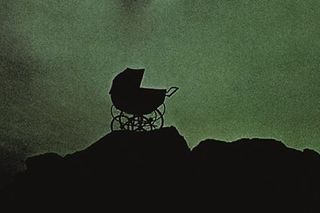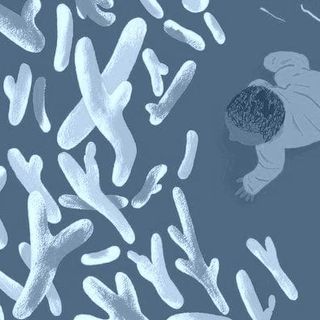
The Pathological Fear of Getting Pregnant Has A Name: Tokophobia
For some women who want children, pregnancy and childbirth is pathologically frightening.

It’s common for women to feel nervous about getting pregnant and feel anxious about labor and birth once they do. But for some women, the fear of body changes, contractions, interventions, uncertainty and pain during the overall process of pregnancy, labor and birth can be so overwhelming that they avoid getting pregnant or avoid natural childbirth altogether — even though they may actually want to bear children.
It’s a small, but growing group — as many as 13% of the female population may want or wish to have children, but pathologically fear the process of pregnancy and birth. In medical terms, these women are experiencing tokophobia. And because of social media, this paralyzing fear is spreading.
A paralyzing fear
Tokophobia can be experienced by women who aren’t and have never been pregnant (‘primary’ tokophobia), and also by women who have already been pregnant and given birth (‘secondary’). Little is known about tokophobia. There is some evidence that secondary tokophobia might be more common, especially among women who experienced obstetric trauma while previously giving birth. But the only study of tokophobia in India found these paralyzing fears of pregnancy and childbirth more common among women who have never been pregnant.
“Many women, through self-help efforts, talking to peers, doctors or relatives about their fear of getting pregnant or delivery, do cope with the fear and anxieties about pregnancy and childbirth,” says Dr Resham Chakraborty, a gynecologist with Sunshine Maternity Clinic, Mumbai.
Women with tokophobia are unable to cope, however.
Psychologist Girish Shetty, from Mind and Soul clinic in Mumbai says, “While some women with tokophobia choose to avoid pregnancy altogether or, in very extreme cases, even consider termination if they find themselves pregnant; others, in order to avoid giving birth naturally, forcefully opt for a C-section.”
Gemima Rigby’s tokophobia “manifested in physical symptoms of pregnancy, like experiencing a metallic taste in my mouth, frequent urination, and even the sensation of something moving inside me,” she wrote for Broadly in 2018. “I’ve had dozens of pregnancy tests over the years, and despite always using condoms during sex, I’ve taken the morning-after pill more times than I can count.”
Tokophobia can be triggered by a traumatic vaginal delivery, stillbirth, miscarriage, or termination of pregnancy, says Dr Chakraborty. Women who feel that the level of labor pain they experienced was out of control, or totally unexpected, may also desperately resist ever going through such a process again.
Rigby credits her tokophobia to unexpected and traumatizing exposure, at age 13, to “a picture of a woman laying down with her legs spread and a baby’s bloody head protruding from her vagina,” in a book about pregnancy, combined with diagnosed obsessive-compulsive disorder.
US-based National Center for Biotechnology Information lists various reasons for the emergence of tokophobia. The pathological fear could be happening as a result of neurohormonal homeostasis (disturbances in mechanisms that regulate anxiety), the database states, or concern related to the quality of medical care — for instance, ineffective pain control or lack of confidence in the delivery team.
Related on The Swaddle:
Can Women Who Need Mental Health Medication Keep Taking It During Pregnancy?
“Most women who fear pregnancy or childbirth are worried about an injury, chronic illnesses, such as urinary incontinence, or a pelvic organ prolapse,” says Dr Chakraborty. “They have a low threshold for pain, which leads to the fear that they will not be able to tolerate childbirth hence dread pregnancy and childbirth.”
But, like Rigby, tokophobia could be brought on by exposure to the increasing number of — and increasingly detailed — accounts of others’ birthing experiences on social media.
“One of my patients had read someone’s blog about undergoing episiotomy and that had put her off having a baby completely,” Dr Chakraborty says. The woman wanted a child, but was terribly afraid of the experience of reproducing. “Women do hear a lot about childbirth or read about it in detail through other people’s blogs, videos, Instagram, that it overwhelms them or causes them to lose control over their wish to have a baby.”
Tokophobia during pregnancy
Women with tokophobia typically want biological children, they just fear the experience of pregnancy and childbirth — which can make the changes in physical appearance and physiology, and the feeling of the baby’s movements very difficult, if and when they do become pregnant. For some women with tokophobia, “before or during pregnancy they may have anxiety, insomnia and sleeplessness along with eating disorders, while post-delivery, women may undergo heightened postnatal depression,” he adds.
For survivors of sexual or childhood abuse, tokophobia during pregnancy can be even more debilitating; the fear can be compounded by feelings of loss of control and privacy, especially during invasive exams and even natural delivery, which can revive traumatic memories.
Related on The Swaddle:
Eating Disorders Are Common Among Pregnant Women, But Support Is Lacking
But whether rooted in trauma or not, tokophobia can have devastating effects on women and their families.
“Some women will avoid pregnancies, even if they want to have a child, and for those who are already pregnant, the condition might dictate their choice for how they want to give birth,” says Dr Shetty.
Therefore, the best first step would be to ensure that they have a good support system. “Better the support system, less the prenatal stress and the load,” says Dr Shetty. “Most women who fear pregnancy seek advice and support from family, mothers, sisters, spouses, friends and colleagues. Therefore, it’s important that we see if she’s undergoing any feeling of fear regarding pregnancy and childbirth, try to understand why and seek help immediately,”
Additionally, for those experiencing secondary tokophobia, it might help to seek therapy to work through a previous traumatic birth. “It’s dangerous for the mother and the baby if they don’t undergo these sessions, as it might result in an unnecessary C-section delivery, or severe post-natal depression in mothers,” he adds.
Last, but certainly not least, Dr Chakraborty says the people in women’s support networks should help orient a woman with tokophobia toward real-world activities, and away from the social media black hole of birth experiences. She suggests visiting maternity wards, scheduling chats with the OB/GYN outside of regular check-ups, and seeking positive birth stories to help women manage their fear, which all has one more, crucial benefit.
“Most importantly, some women find the condition can be very isolating, feeling that nobody else shares this intense fear. For these women, simply knowing that they are not alone, can be very comforting and helpful,” she adds.
Anubhuti Matta is an associate editor with The Swaddle. When not at work, she's busy pursuing kathak, reading books on and by women in the Middle East or making dresses out of Indian prints.
Related


How To Boost Executive Functioning Skills for Kids Aged 7 to 12
